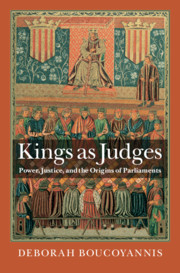Book contents
- Kings as Judges
- Kings as Judges
- Copyright page
- Contents
- Figures
- Tables
- Preface and Acknowledgments
- Part I The Origins of Representative Institutions: Power, Land, and Courts
- 1 Introduction: From Roving to Stationary Judges
- 2 A Theory of Institutional Emergence: Regularity, Functional Layering, and the Origins of Parliament
- 3 Explaining Functional Layering and Institutional Fusion: The Role of Power
- Part II The Origins of Representative Practice: Power, Obligation, and Taxation
- Part III Trade, Towns, and the Political Economy of Representation
- Part IV Land, Conditionality, and Property Rights
- Part V Why Representation in the West: Petitions, Collective Responsibility, and Supra-Local Organization
- Bibliography
- Index
3 - Explaining Functional Layering and Institutional Fusion: The Role of Power
from Part I - The Origins of Representative Institutions: Power, Land, and Courts
Published online by Cambridge University Press: 18 June 2021
- Kings as Judges
- Kings as Judges
- Copyright page
- Contents
- Figures
- Tables
- Preface and Acknowledgments
- Part I The Origins of Representative Institutions: Power, Land, and Courts
- 1 Introduction: From Roving to Stationary Judges
- 2 A Theory of Institutional Emergence: Regularity, Functional Layering, and the Origins of Parliament
- 3 Explaining Functional Layering and Institutional Fusion: The Role of Power
- Part II The Origins of Representative Practice: Power, Obligation, and Taxation
- Part III Trade, Towns, and the Political Economy of Representation
- Part IV Land, Conditionality, and Property Rights
- Part V Why Representation in the West: Petitions, Collective Responsibility, and Supra-Local Organization
- Bibliography
- Index
Summary
Incentives to attend parliament should have been common to both the French and the English nobility . Yet only the English nobility ended up being regularly involved in parliamentary proceedings. Their presence was fundamental for functional fusion and institutional layering to occur. Only where the nobility was compelled to attend parliament, especially in connection to its judicial functions, did the crown have a regular forum to raise taxation. Justice provided the regularity that taxation did not, allowing the institution to consolidate. Conversely, when the most powerful groups were regularly present in a central institution, they were able to solve their collective action problem and cooperate to oppose the crown. The chapter thus shows that the capacity of the English crown to compel nobles for judicial and political service was greater than that of France. The point is further established through the literature on Legal Origins, which explains the divergence of Common from Civil Law, as well as by an assessment of the remarkable level of conscription of English subjects to perform judicial functions that were disbursed by paid officials in France.
Keywords
- Type
- Chapter
- Information
- Kings as JudgesPower, Justice, and the Origins of Parliaments, pp. 59 - 84Publisher: Cambridge University PressPrint publication year: 2021

